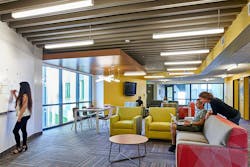Student housing trends: The transformation of co-living in college
Several months ago we wrote about the new emergence of innovative co-living solutions: development projects where shared living spaces and amenities are attached to private sleeping areas to create a more communal (and affordable) urban housing experience. Many responded that it sounded like grown-ups living in a college dormitory, so it’s only natural that new names in the student housing market are taking this concept one step further.
The Student Hotel is one such project that is using a new model for delivering housing solutions for students globally. With six locations in The Netherlands, France and Spain, they offer a hybrid of long-stay student accommodations with the look and feel of a boutique hotel. The branding and design of public spaces are by cutting edge design firm ...,staat | Amsterdam.
The private bedrooms are fully furnished and arranged in suites around communal kitchens, along with various shared spaces such as social lounges, game centres and study areas which encourage greater student interaction and collaboration. Not affiliated with any specific universities, students from various learning institutions and fields of study can make connections in an environment that fosters co-habitation and a greater sense of community.
This concept not only provides an upgrade to the current offerings in temporary student housing, but may also prove to be disruptive in the hotel industry. The Student Hotel company uses public-private partnerships to fast track development, going from property acquisition to facility opening in as little as a year. Properties range from 350-700 units, and with the announcement of Perella Weinberg Real Estate’s capital investment of €150 million dollars, the Amsterdam-based company aims to expand to over 10,000 rooms across Europe by 2020.
On a student housing project in London, Gensler has developed a room design that is clean and simple, allowing the students space to work privately, providing a larger than average size bed and all fit into 14 square metres, with natural ventilation, in a London high-rise this is quite a feat.
Gensler is working with this client to develop unique spaces to provide the students opportunity to explore their chosen career path in a real-world environment. This space pictured below is designed for students studying fashion to have a space to work outside their room and exhibit their work, where they could meet with professionals and even produce a fashion show. We are calling this space the fashion HUB.
Today, the number of international students are increasing, and their expectations for academic living are not limited to the four walls of the bedroom. They desire a higher quality of hospitality. They want a space to meet people, collaborate, learn and play, spaces that will enhance the social living experience to support and improve academic and personal growth.
In another Gensler project at Biola University, these shared spaces were geared not just to socializing but to social learning, an important shared space for academic purposes.
At the same time, higher education curriculum is changing in recent years. There’s a higher demand on additional courses and degrees. Curriculums are going online and there’s an increase in distance learning and short courses. Student accommodations are changing to cater to those circumstances. The Student Hotel can provide a flexible period of short or long stay to meet the needs of different groups of students and user groups – it is not one size fits all.
The Student Hotel’s concept not only targets students, but also business travellers and tourists. It offers the right mix of hotel, office and living spaces. This platform also acts as a knowledge exchange space that offers the potential for students to meet their future employers. After graduation, it becomes a place for transition with affordable luxury accommodation and facilities. The mix of students, professionals and travellers creates a unique and exceptional experience – the key ingredient for building a vibrant community.
About the Authors:
Jonathan Breen is an architect with 15 years of experience working in the residential, hospitality, retail centers, and mixed-use sectors. He joined Gensler’s Los Angeles office in 2011 and has played a leading role on large retail and entertainment driven mixed-use projects throughout world. Now in London he is currently researching the London residential market as part of a Firmwide initiative RESIDE. Contact him at [email protected].
Diana Lee works closely with architects and engineers on projects from London to the Middle East, developing schemes from small private courtyard design to city-scale master planning. These projects often range from concept design stage to construction design stage. Diana is now part of the London Museums research team focused on the challenges museums and cultural institutions are facing and how these are being tackled and approached. Contact her at [email protected].

